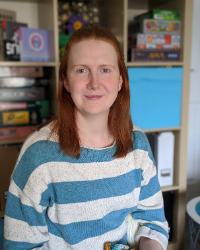Louise Hartley
Research Support Officer from Generation Scotland speaks to us

Hi Louise, how do biobanks help you?
Generation Scotland is a type of biobank. We hold volunteer samples and linked data in an anonymized form, meaning we don’t know who the data or sample belongs to. Only a small number of people within Generation Scotland can link a person to their samples and data if we need to for any reason. Other researchers can apply for data, samples or both, be ethically approved, and can then use these within their research. Our aim is to ensure this is as representative of the Scottish population as is possible. This year we are re-opening recruitment and anyone aged 12+ living in Scotland can join our cohort. Our aim is to increase the number of volunteers with us alongside diversifying, making sure everyone is represented.
What is the most interesting or most useful thing you know which a biobank has been used for?
When I started working for Generation Scotland there were a number of papers being released about a condition called synesthesia. This is where people see numbers in colour, or when numbers have genders or personalities. I found the whole thing fascinating and never came across anything like it as a child health nurse. After talking with friends I found out one of them had synesthesia and wasn’t aware until coming to university. The research areas open up lots of conversations with people from a variety of backgrounds, scientists, friends, work colleges and sometimes strangers on a bus.
This is what I really like about the biobank research. It allows approved researchers to look at things that interest them and as a result Generation Scotland impact a huge variety of conditions, studies and aspects of life rather than being focused on just one remit. I find it exciting to read about a new publication that uses our annoymised data to figure something out and it means I get to read around a large number of subjects I otherwise wouldn’t be aware of.
Have you had to grapple with any ethical or social issues around biobanks and if so how did you deal with these?
I’m known in Generation Scotland for being the ethics lady, simply that I help the team write the submissions to the local NHS Research ethics committee (REC) and ask them to review it. In order to do so there is a lot of work our team and the REC do before it is shared to ensure we are thinking of all the implications of our work and who it may impact. We recently got permission to recruit 12-15 year olds in Scotland as part of NextGen and this was really exciting as it’s not really been done before. Every member of the GS team was involved making sure the communications, questionnaires and other documentations were all appropriate. We had to really carefully think about areas such as consent and advocacy as well as autonomy, all meaning to ensure everyone knew what they were signing up to and why and that they could make that decision for themselves.
Once submitted a review board look at all our documentation, ask lots of questions, and decide if we can go ahead with our study plans. Most of the time they have suggestions or tweaks to the wording to ensure it’s clear to our volunteers which we then change before we start finalizing these documents to send out to people. We are always changing our plans to ensure the process is ethical and socially acceptable, and try and review these periodically as things happen to change these positions. This can be as a response to a change in opinion, or a better way of using certain words and always requires a careful balance of different perspectives.

